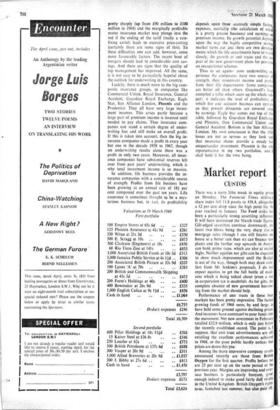Market report
CU y'1
There was a nasty little break in equity prices on Monday. The Financial Times ordinary share index fell 11.8 points to 458.4, altogether a 12 per cent drop since the high point for the year reached in January The Ford strike has been a particularly strong unsettling influence. It will have deCimated the March trade figures. Gilt-edged securities continue downwards, the latest two blOw's being the very sharp rise in mortgage rates (though I can still finatice my house at a better rate than ict can finance new plant) and the further step upwards in Ameri- can bank prime rates, which are 'also at record highs. Neither equities nor gilts can be expected to show much improvement until the Budget is out of the way, though both may draw com- fort from Mr Jenkins's proposals. I do not expect equities to get the full bottle of medi- cine which is being talked about (even a rise in corporation tax is doubtful). As for gilts, the complete absence of new government borrow. ing from the market should help.
Performance of unit trusts in tbeie bear markets has been pretty Impressive. The fastest growing funds of 1968 seem, by and large, to have held some ground against declining prices And investors have continued to pour funds into the movement. Net new investment in February totalled £32.9 million, which is only just below the recently established record. The point is, I suppose, that unit trust advertisements are still extolling the excellent performances achieved in 1968, so the poor public hardly notices that prices are down this year Among the more impressive company results announced recently are those from British Oxygen for the first quarter. Profits before tax are 25 per cent up on the same period of the previous year. Margins are improving and over• seas- business is particularly buoyant, good enough indeed to make good fairly dull results in the United Kingdom. British Oxygen's rights issue, launched last summer, has also paid off,










































 Previous page
Previous page